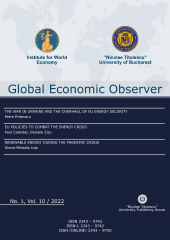Click to download – Review form
PEER REVIEW POLICY
All the submitted manuscripts will be sent for review unless they are out of scope or below the exigencies and requirements of the journal.
Each manuscript will be sent to two experts for an informed recommendation on whether the articles should be accepted for publication.
Typically we employ a ‘double-blind’ review system, where both reviewer and author are anonymous to each other.
REVIEWERS’ GUIDELINES
Dear reviewer, thank you for the time, effort and expertise that you contribute to reviewing the manuscripts we submit to your attention. Without them, it would be impossible to maintain high standards of the articles in our journal, the Global Economic Observer (GEO), and its good reputation.
When reviewing the submitted manuscript, we would like you to primarily check if it is a coherent work, which adds to the knowledge, understanding and/or practice in their field. We would also like you to:
-
1. Be critical. But, because vague criticism is not helpful, we expect you to justify all criticism by specific reference to the text, or to the literature in the field.
2. Be specific, referring to the exact place in the paper where you want changes to be operated and also be clear when making your comments and suggestions.
- Indicate the major compulsory revisions you want to be done (if any) by letter “M” (higher case m, coming from “Major”), numbering your comments, referring to the page number in the manuscript and suggesting what additional work or clarification is needed. e.g.:
M.1 (p. 5) Text data and table data do not match.
M.2 (p.7) Assumptions not consistent with previous information from page 6, paragraph 2. Suggest statistics double-checking and reconsidering interpretation.
- Indicate minor but essential revisions by letter “m” (lower case m), numbers and pages as above. Such revisions refer to spelling mistakes, wrong use of a term, missing details, etc. e.g.:
m 1 (p. 3) Author refers to BIRC, instead of BRIC countries;
m 2 (p. 8) Figure 5 has no legend.
- Indicate discretionary revisions by letter D (higher case d) according to the examples above. These are recommendations and revisions which the author may choose to ignore. E.g.:
D 1 (p. 3)
-
3. Give a clear recommendation to the editor:
a. Accept without revisions;
b. Accept with minor essential revisions;
c. Major compulsory revisions requested;
d. Reject because of scientifically or ethically unsound;
e. Reject because out of scope or too small an advance to publish.
4. Be in time. The reviewer should meet the deadline agreed with the editor-in-chief.
REVIEWERS’ ETHICAL RESPONSIBILITIES
a. The reviewer should decline to review manuscripts which are not in his/her area of expertise or which cannot be completed on time.
b. The reviewer should always avoid any conflict of interests. He/she should avoid biases that influence an impartial scientific assessment of the manuscript and should be guided in his/her work only by the scientific merit of the research.
c. The reviewer should analyse the strengths and the weaknesses of the manuscript and provide an honest critical assessment of the research.
d. The reviewer should not participate in plagiarism, taking data and ideas from a new, unpublished scientific paper he/she was entrusted with, in order to use and advance them as his/her own work.
e. The reviewer should maintain confidentiality about the existence and content of the manuscript he/she was entrusted with.
f. The reviews should be written in a collegial, constructive manner.

